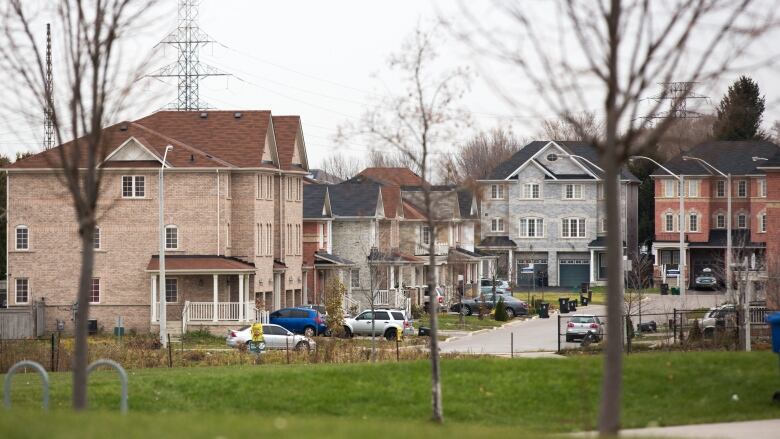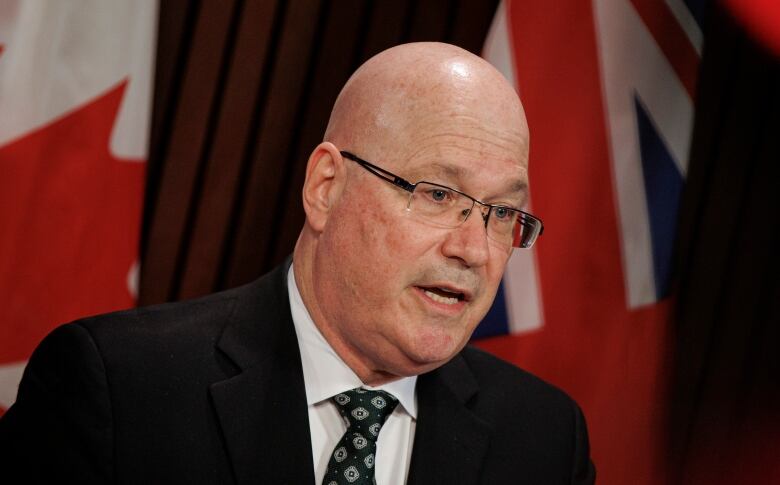Ford government unveils plans to fix soaring Ontario housing prices but not everything's on the table
Opposition says bill 'does nothing to make homes more affordable'

Premier Doug Ford's governmentis unveiling the first phase of its plan to deal with the skyrocketing cost of buying a home in Ontario.
The government has tableda bill that, in part, takes aimat delayswithin planning at the municipal level, suggesting the approval process in place slows down home construction and drives up prices.
Steve Clark, municipal affairs and housing minister, told reporters after the legislation was tabled Wednesday that he is confident this bill will create more housing, faster.
"While housing starts have hit record levels over the past two years, long, drawn out processes are delaying housing, and pushing the dream of home ownership out of reach for too many Ontarians," Clark said at a news conference.
The province first revealed the details of its plans in a dense, 42-page document during a technical briefing with reporters Wednesday afternoon. You can read it at the bottom of this story.
The plancomes after a housing affordability task force convened by the government released a report last month offering 55 recommendations, including a goal of building 1.5 million homes in 10 years.That target is double the current pace of new construction.
Government officials say the task force report gives them a long-term roadmap, but many of itsrecommendations are not addressed in today's legislation, including changing municipal zoning rules to allow more housing to be built aside from single-family homes.
To get more homes built more quickly, the task force recommendedthe province impose sweeping changes on cities. The proposals includeincreasing density in neighbourhoods of single-family homes, spending less timeon public consultations forhousing projectsand imposing deadlines for housingapprovals.

Clark said moves to allow for more density in single-family neighbourhoods weren't part of the plan because some municipalities, like Toronto and Mississauga, "just aren't there yet."
While high housing prices are nothing new in the Greater Toronto Area, the cost of buying a home just about everywhere in Ontario is also soaring.
In 2021, the average sale price of homes in the province was 44 per cent higher than two years earlier, according to figures from the Canadian Real Estate Association.
New municipal powers
Municipalities will also get a new poweras part of the incominglegislation.The province says they can use its new Community Infrastructure and Housing Accelerator tool to speed up approvals for the creation of non-profit housing, community centres, hospitals, long-term care homes or other similar projects.
However, to do that, city councils must submit a request to the housing minister explaining why they want the project, what approvals they need and how the public has been consulted. In turn, the minister will be able to impose conditions on the project. The accelerator can't be used for Greenbelt land, the province said.
The bill also contains measures to streamline subdivision andsite plan approval processes, which deal with elements such as walkways and parking, as wellas approvals for modular multi-unit residential buildings.
Municipalities would also have to refund zoning by-law amendment fees after Jan. 1, 2023 if they don't make a decision within legislated timelines.
The province says it is also putting $19 million over three years toward reducing backlogs at the Ontario Land Tribunal and Landlord and Tenant Board.
NDP Leader Andrea Horwathslammed the bill in a statement, saying it "does nothing to make homes more affordable.
"It doesn't build starter homes or 'missing middle' homes like duplexes and townhomes," Horwath said."The bill does nothing to take on speculation. It doesn't help renters or buyers. It doesn't even do the bare minimum [the government's]own task force recommended."
Ford has blamed high house prices in part on city councils moving too slowly to approve housing developments. At a summit in January with mayors from Ontario's 30 biggest cities, he announced a $45-million fund to streamline approvals.
The affordability task force's report did not go over well with many of the mayors and councils in the province, particularlyin suburban cities of the GTA.
That could influence the Ford government's willingness to forge ahead with the recommendations, since seatsin the 905 region are expected to be key battlegrounds in the upcoming provincial election and could ultimately sway the result.

A governmentofficial, whoCBC News agreed not to name, saidthe billreflects a balance between what the task force recommended and the feedback the government received from municipalities and the public.
Municipal councils "have been frank about needing to be involved in the design and development of the policies in the task force report," said the official, adding that the government acknowledges it needs to work together with the municipalities to make things happen.
Immediate impact uncertain
It's far from certain whether the measures coming from the government Wednesday will have any short-term impact on the price of buying a home in Ontario.
The task force's recommendations were almost entirely focused on boosting the supply of housing over the coming years.
Some real estate analysts and the opposition parties are calling on the government to addressdemand factors that drive up prices.Recent sales figures show that 25 per cent of Ontario home purchases are being made by investors who own more than one property.

Late Tuesday afternoon, the Ford government announced it is boosting Ontario's foreign buyers tax on residential real estate to 20 per centand expanding its scope to apply province-wide.
Ontario's "non-resident speculation tax" was introduced in 2017 by the then-Liberal government of Kathleen Wynne at a time when home prices were rising sharply. It had a significant impact, pushing prices downward into 2018.
The tax rate was 15 per cent on purchasesby non-resident buyers of homes in the GTA and across a swathof southern Ontario stretching from Peterboroughthrough Barrie, Waterloo and the Niagara Peninsula.
The new 20 per cent rate and its application across the province takes effect immediately.
The Opposition New Democrat and Green parties are proposingadditional speculation taxes as well as a vacancy tax to try to dampen demand from investors who don't live in the homes they buy.
"This government has had four years and they finally discovered there's a housing crisis," Horwath said at a news conference on housing last week in Stratford.
Horwath dismissed the task force recommendations as "pretty much one side of the coin" for their focus on the supply of market housing.
Here's the Ontario government's presentation outlining the first phase of its plan:
(PDF KB)
(Text KB)CBC is not responsible for 3rd party content
With files from Mike Crawley and The Canadian Press












_(720p).jpg)


 OFFICIAL HD MUSIC VIDEO.jpg)
.jpg)



























































































